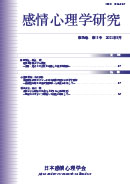
- Issue 3 Pages 57-
- Issue 2 Pages 29-
- Issue 1 Pages 1-
- Issue Supplement Page・・・
- |<
- <
- 1
- >
- >|
-
Situations that characterize contempt: An exploratory study using comparisons with disgust and angerTetsuya Fukuda, Hitomi Kuranaga2021Volume 28Issue 3 Pages 57-66
Published: May 30, 2021
Released on J-STAGE: June 25, 2021
JOURNAL FREE ACCESSThis study examined the types of situations that evoke contempt. Further, to identify situations that characterize contempt, (a) based on participant responses to each situation, contempt, disgust, and anger were compared; and (b) the intensity of contempt was compared between situations. In the preliminary study, information on situations wherein participants felt contempt was collected and categorized based on content similarity. In the main study, the intensity of feelings of contempt, disgust, and anger regarding situational items developed in the preliminary study were rated. Cluster analysis based on the scores of the three emotions showed that the situational items could be classified into clusters of: “disrespectful behavior,” “shortsighted behavior,” and “lacking common sense.” A repeated two-way analysis of variance (regarding situation clusters and types of emotion) revealed that the intensity of contempt was stronger (a) than that of disgust and anger in cases of “shortsighted behavior” and “lacking common sense” and (b) in cases of “shortsighted behavior” than in cases of “lacking common sense.” Therefore, we conclude that “shortsighted behavior” characterizes contempt.
View full abstractDownload PDF (405K)
-
Kanae Ogasawara, Atsuko Nakagawa2021Volume 28Issue 3 Pages 67-72
Published: May 30, 2021
Released on J-STAGE: June 25, 2021
JOURNAL FREE ACCESSWe investigated how rejection avoidance need (RAN) affects public speakers before, during, and after a speech. This study was comprised of two sessions. First, 303 participants completed a questionnaire measuring their RAN, and were assigned into two groups: high and low RAN. Second, in a lab experiment, they delivered a two-minute speech, before/during/after which they responded to the high arousal scale, measuring their psychological tension. Their physical arousal was assessed measuring heart rate (HR) level before/during/after the speech. The results indicated that speakers in the high RAN group had higher psychological tension and HR when feel failure during speech. These results point to the likelihood that RAN negatively affects failure recognition.
View full abstractDownload PDF (388K) -
Mai Hamana, Ai Mizokawa2021Volume 28Issue 3 Pages 73-79
Published: May 30, 2021
Released on J-STAGE: June 25, 2021
JOURNAL FREE ACCESSThe purpose of this study was to examine the relationship between maternal emotion socialization, given while viewing illustrations designed to elicit talk about emotions, and young children’s psychological adjustment. Participants were 46 mother–child pairs and their nursery school teachers. The results showed that mothers’ supportive explanations were associated with low levels of hyperactivity and conduct problems in children. These findings suggest that children might learn how to manage their own negative emotions from maternal supportive explanations about how others manage their negative emotions, thereby modeling socially adaptive behavior.
View full abstractDownload PDF (359K)
- |<
- <
- 1
- >
- >|